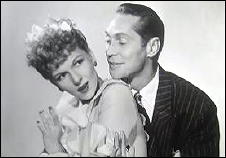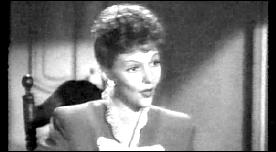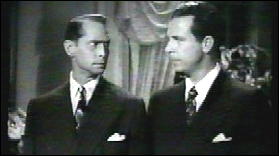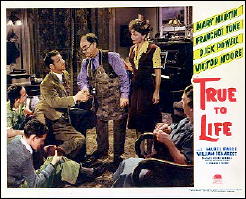Fri 25 Feb 2011
A Movie Review by David L. Vineyard: TRUE TO LIFE (1943).
Posted by Steve under Films: Comedy/Musicals , Reviews[2] Comments

TRUE TO LIFE. Paramount Pictures, 1943. Mary Martin, Franchot Tone, Dick Powell, Victor Moore, William Demarest, Mabel Paige, Ernest Truex, Clarence Kolb. Director: George Marshall.
Delightful George Marshall screwball comedy with Powell and Tone radio soap opera writers who have hit a dry spell and are facing an angry sponsor (Clarence Kolb) who want to cancel the continued adventures of Kitty Farmer. Powell goes out in the rain looking for inspiration and meets Mary Martin in a diner where she mistakes him for a homeless guy out of work because he left his wallet at home.

She brings him home to meet eccentric dad Victor Moore who is constantly tinkering with nonsensical inventions; Uncle William Demarest, a grouch who can’t (or won’t) work (Mom: Now you’ve hurt his feelings. Pop: They never seem to bother him at the dinner table); Mom, Mabel Paige, who has no patience with the new out of work addition to the family; a little brother who wants to be doctor and keeps asking people for blood; and little sister who has hit puberty at about 90 miles per hour and has eyes for the new boarder.
Using the family for their inspiration Powell and Tone have a hit on their hands, and Powell moves in with the family to get more inspiration, but Tone gets suspicious, and posing as a playboy, he begins to move in on Mary Martin.

Meanwhile Powell has to keep the family from hearing the radio program and is forced by suspicious Mom to take a job at the bakery with Pop. And keeping the family from hearing the program gets harder and harder, especially when they do hear the show and notice how close it is to their everyday life — right down to the dialogue.
The usual complications ensue. Martin tries to get Tone to hire Powell, and Demarest finds out Powell has been sabotaging the family’s radio to keep them from listening to the broadcast and figures out what they boys are up to.
Fame sits well with the family who find themselves on easy street — Moore even puts Demarest to work at the bakery — but Martin doesn’t like her new family and Moore puts his foot down to bring Martin and Powell together for the finale, turning the tables on Powell and Tone with the help of their director Truex.

While not a musical, Martin sings “Mister Pollyanna,” and Powell does likewise for the memorable Hoagy Carmichael and Johnny Mercer tune “The Old Music Master,” and “There She Was,” a more typical Powell tune.
Marshall was one of the masters of the screwball school and with this cast could hardly fail. While only mildly satirical, Powell is fine, Martin lovely and feisty, Tone good in his usual second lead mode (even breaking the fourth wall in the final scene), and Victor Moore delightful — especially in conflict with Demarest and browbeaten by Paige.
In addition its interesting to see Powell in transition from this boy crooner to the mature screen persona that blossomed with Murder My Sweet three years later, and begun in Preston Sturges 1940 film Christmas in July.
You do have to wonder, though, if most radio writers were pulling down a $1,000 a week and sharing a penthouse apartment and a valet in 1943 New York.
February 26th, 2011 at 5:41 pm
Sounds like my kind of movie, one I hadn’t heard of before. Mary Martin’s always a delight to watch on the screen, and while I sometimes find Dick Powell’s performances a little too smug, there’s never doubting his power as a star, even in “fluff” such as this.
I’m certainly glad he managed to work himself out of these kind of roles, as fun as they are to watch.
February 26th, 2011 at 8:13 pm
This one is somewhere halfway between Powell’s boy crooner roles and his later more serious films and grown up comedies. His opening scenes with Martin with him showing a few days worth of beard and walking in the rain will clearly have you thinking of his later noir career.
I’m likely a bit more of a fan than you sound to be, but then I always thought he was one of the few actors who could be smug and vulnerable at the same time.
Mary Martin did far too few films, but had real presence on screen (not always true of stage stars) Here she is mindful of Jean Arthur — which is no small compliment — especially in a screwball comedy.
This one isn’t as seamless as the very best screwball comedies, and much less antic, but it has a good deal of charm including Powell and Moore indulging in some physical comedy. Mostly it is the kind of film you come away from feeling good about.
Some of the jabs at radio had more punch then too, but you can still get a kick out of the glowering of Powell and Tone and the beaming smile of sponsor Kolb whenever they play the jingle for his company before the program starts.